Victorian Morality
The sad young man悲哀的青年一代
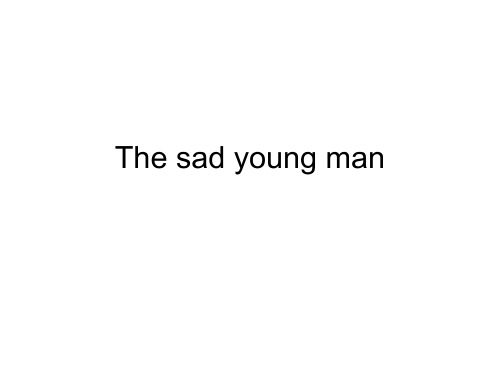
• logical outcome: necessary or expected result or consequence. • Western world: all the countries in the western hemisphere and Europe. • aftermath: a consequence, esp. of a disaster or misfortune.
?美国工业的蓬勃发展加上它强大喧闹的工厂公司的冷漠无情和它大规模的侵略性再也没有为这个多平静少竞争的年代里的政治行为的准则和良好的教养留下任何余地
The sad young mae nature of the revolt of the young people? • 2. What were the historical conditions of the age?
• We had reached…bordering oceans: metaphor, comparing “provincial morality” to “artificial walls” We have become a world power so we can no longer on our action just follow the principles of right and wrong as accepted in our own country, nor can we remain isolated geographically protected by the Atlantic and Pacific oceans. In other words, the U. S. can no longer pursue a policy of isolationism.
现代主义时期英国文学背景

The Modern period Introduction现代时期简介Modernism rose out of skepticism and disillusion of capitalism.现代主义的兴起源于对资本主义的怀疑和幻灭。
The first world war and the second world war had greatly influenced the English literature.第一次世界大战和第二次世界大战极大地影响了英国文学。
The catastrophic First World War tremendously weakened the Brish Empire and brought about great sufferings to its people as well.灾难性的第一次世界大战极大地削弱了布里什帝国,也给其人民带来了巨大的痛苦。
Its appalling shock severely destroyed people’s faith in the Victorian values.其骇人听闻的冲击严重摧毁了人们对维多利亚时代价值观的信心。
The postwar economic dislocation and spiritual disillusion produced a profound impact upon the British people who came to see the prevalent wretchedness in capitalism.战后的经济混乱和精神幻灭对英国人民产生了深刻的影响,他们看到了资本主义普遍存在的悲惨状况。
The Second World War marked the last stage of the disintegration of the British Empire.第二次世界大战标志着大英帝国解体的最后阶段。
加拿大与维多利亚时代【英文】
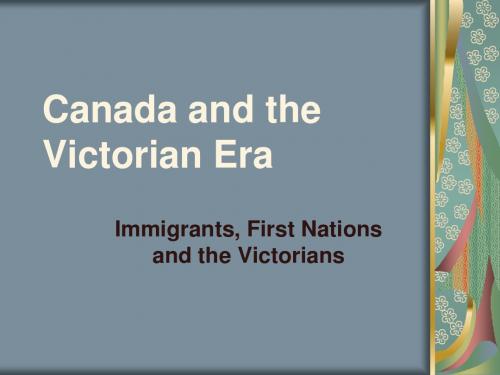
Native Peoples/First Nations
The Native Peoples
Native peoples were pushed to the outskirts of society. They were forgotten and ignored unless the Europeans wanted to buy “Indian” lands to employ “Indian” labourers. The Indian way of life was changed due to this displacement. For example Algonquians, had traditionally relied on hunting and fishing for food. However, they had to turn to small-scale fruit and vegetable gardening and even started to shop at the local food stores due to the growth of immigrant settlements throughout the Eastern woodlands.
The Native Peoples Many Native bands had to rent out their prime reserve land due to dire living conditions. Despite many measures to assimilate Native peoples into White society, Native cultures stayed alive by oral histories and traditions passed down by the eles (cont’d)
乔治艾略特的女权主义在《弗洛斯河上的磨坊》中的体现

Contents
•Life experiences •Main works •The characteristics of Eliot’s literary works
Life experiences
• George Eliot— pseudonym of Mary Ann, or Marian, Cross , Evans
--Women were seen as samples of love and purityand so, could not be used for physical exertion or pleasurable sex. --The only role of womeried ,have children, please their husbands and look after the homely chores.
Feminism &the Mill on the Floss
content
• • • • regarded as the autobiographyof the auther herself. a story about the Maggie and Tom Maggie's childhood bankcruptcy
Tom gave up the chance of education, work for the family' life.Maggie changed her personality.
5 Women in the workforce
–The explosive growth of industry, especially the textile industry, brought hundreds of thousands of women into factory jobs.
《弗洛斯河上的磨坊》

Eliot's birthplace at South Farm, Arbury
1841 Eliot and her father moved to Foleshill富利斯希尔 near Coventry 考文垂 The closeness to Coventry society brought new influences, most notably those of Charles and Cara Bray卡拉布雷 Critical about religion
Main characters
• Maggie Tulliver- Young female protagonist • Tom Tulliver- Maggie's brother • Philip Wakem- Hunchbacked 驼背 classmate of Tom, and friend/suitor to Maggie • Mr Tulliver- Maggie's and Tom's father, owner of the mill. • Stephen Guest- Affluent suitor to Lucy
3 Victorian morality and sexuality
Women were expected to have sex with only one man, their husband. However, it was acceptable for men to have multiple partners in their life.
The Characteristics of Eliot’s Works
As a woman of exceptional intelligence and life experience, George Eliot shows a particular concern for the destiny of women, especially those with great intelligence, potential and social aspirations. In her mind, the pathetic tragedy of women lies in their birth. Their inferior education and limited social life determine that they must depend on men for sustenance and realization of their goals , and they have only to fulfill the domestic duties.
英国文学维多利亚时期全集

Victorian
literature, in general, truthfully represents the reality & spirit of the age. The high-spirited vitality, the down-to-earth earnestness, the good-natured humor and unbounded imagination are all unprecedented 空前的. In almost every genre it paved the way for the coming century, where its spirits, values & experiments are to witness their harvest.
. Charles Dickens (1812-1870)
the
greatest representive of English critical realism Born at Portsmouth, his father was put into the prison for debt when he was only 12 Worked in underground shoeblacking then lawyer’s office as a junior clerk In 1835, became a reporter, later an editor, manager
Chapter II the Victorian Literature
magnitude众多
& diversity: Great writers and great works abounded It was many-sided, complex, reflected both romantically and realistically the great changes that were going on in people's life and thought.
The-Sad-Young-Men-习题答案
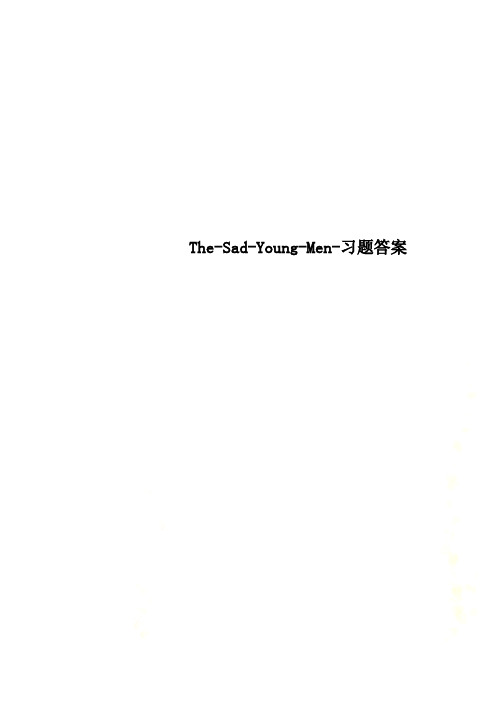
The-Sad-Young-Men-习题答案The Sad Young Men 习题答案/answerⅡ.1.The younger generation of the 1920s were thought to be wild because 1hey visited speakeasies, denouced Puritan morality, etc. (See para. 1).2. "Yes" and "no Yes" because the business of growing up is always accompanied by a Younger Generation Problem, "no" because all their actions can now be seen in perspective as being something considerably less sensational than the degeneration of jazz mad youth.3. Yes. Youth was faced with the challenge of changing the standards of social behavior, of rejecting Victorian gentility. But in America the young people tried to escape their responsibilities and retreat behind and air of naughty alco-holic sophistication and a pose of Bohemian immorality.4. The revolt was logical and inevitable because of the conditions in the age. First of all, the rebellion affected the entire Western world. Second, people in the United States realized their country was no longer isolated in either politics or tradition and that they could no longer take refuge in isolationism.5. All the activities mentioned above were means to help the young people to escape their more serious responsibilities of changing society and most young people went in for these activities. It became a general pattern of behavior.6. The war whipped up their energies but destroyed their naivette. It made them cynical. They could not fit themselves into postwar society so they rebelled and tried to overthrow completely the gentel standards of behavior.7. Intellectuals and non-intellectuals began to imitate the pattern of life set by those living in Greenwich Village. These people lived a Bohemian and eccentric life. They defied the law and flouted all social conventions. They attacked the war, Babbittry, and "Puritanical" gentility.8. These young intellectuals wanted America to become more sensitive to art and culture, less avid for material gain, and less susceptible to standardization.9. They emigrated to Europe because there "they do things better" than in the United States where people only care for money and wealth. Only in Europe will they be able to find remedy for their sensitive minds.10. They were called the "lost generation" by Gertrude Stein because they were troubled and worried and had emigrated to Europe. But they were never really lost for they finally returned to America and produced the liveliest, freshest, most stimulating works in America's literay experience.Ⅲ.1. The structural organization of this essay is clear and simple. The essay divides logically into paragraphs with particular functions: to introduce the subject (introduction) in paragraph 1, to support and develop the thesis (the body or the middle) in paragraphs 2 through 9, to bring the discussion to an end (conclusion)in paragraphs 10 and 11.2. Horton and Edwards state their thesis in the last paragraph of the essay:"The intellectuals of the Twenties, the "sad young men", as F. Scott Fitzgerald called them, cursed their luck but didn't die; escaped but voluntarily returned; flayed the Babbits but loved their country, and in so doing gave the nation the liveliest, freshest, most stimulating writing in its literary experience. "3. They support their thesis by providing historical material concerning the revolt of the younger generation of the twenties in a series of paragraphs and paragraph units between the introduction and conclusion.4. Yes. Each paragraph or paragaph unit develops a new but related aspect of the thought stated in the thesis. Frequently the first sentence of these middle paragraphs states clearly the main idea of the material that follows and indi- cates a new but related stage of the developing thought. For example : The rejection of Victorian gentility was, in any case, inevitable. (paragraph 3). The rebellion started with World War I . (paragraph 5) Greenwich Village set the pattern. (paragraph 7) Meanwhile the true intellectuals were far from flattered. (parageraph 9).5. The two paragraphs form a single unit. The writers begin .with a clearly stated main idea -- Greenwich Village set the pattern and use paragraph 1 to explain Green- wich Village to the reader, following in paragraph2 with sup-porting material showing how the rest of the country imitated life in the "Village".6.Student' s choice.7.Student's choice.Ⅳ.1.At the very mention of this post-war period, middle-aged people begin to think about it longingly.2.In any case, an American could not avoid casting aside its middle-class respectability and affected refinement.3.The war only helped to speed up the breakdown of the Victorian social structure.4.In America at least, the young people were strongly inclined to shirk their responsibilities. They pretended to be worldly-wise, drinking and behaving naughtily.5.The young people found greater pleasure in their drinking because Prohibition, by making drinking unlawful added a sense of adventure.6.Our young men joined the armies of foreign countries to fight in the war.7.The young people wanted to take part in the glorious ad-venture before the whole war ended.8.These young people could no longer adapt themselves to lives in their home towns or their families.9. The returning veteran also had to face Prohibition which the lawmakers hypocritically assumed would do good to the people. 10. (Under all this force and pressure) something in the youth of America, who were already very tense, had to break down.11. It was only natural that hopeful young Writers whose minds and writings were filled with violent anger against war, Babbitry, and "Puritanical" gentility, should come in great numbers to live in Greenwich Village, the traditional artistic centre.12. Each town was proud that it had a group of wild, reckless people, who lived unconventional lives.Ⅴ. See the translation of the text.Ⅵ.1. flapper: (Americanism) (in the 1920s) a young woman considered bold and unconventional in action and dress2. provincial: narrow, limited like that of rural provinces3. code: any set of principles or rules of conduct; a moral code4. Prohibition: the forbidding by law of the manufacture, transportation, and sale of alcoholic liquors for beverage purposes~ specifically in the U. S., the period (1920-1933) of prohibition by Federal law5. agent : an active force or substance producing an effect , e.g. , a chemical agent6. orgy: any wild, riotous, licentious merrymaking; debauchery7. Greenwich Village : section of New York City, on the lower west side of Manhattan: noted as a center for artists, writers, etc.8. draft : the choosing or taking of an individual or individuals from a group for some special purpose, especially for compulsory military service9. distinction: the quality that makes one seem superior or worthy of special recognition10. action: military combat in general11. whip up: rouse; excite12. give: bend, sink, move, break down, yield, etc. from force or pressure13.burden:repeated,central idea;theme14.keep up with the Joneses:strive to get all the mat erial things one’s neighbors or associates have15.write off:drop from considerationⅦ.1.speakeasy:a place where alcoholic drinks are sold illegally,esp.such a place in the U.S.during Prohibition2.sheik:a masterful man to Whom women are supposed to be irresistably attracted3.drugstore cowboy:A western movie extra who loafs infront of drugstores between pictures4.soap opera:a daytime radio or television serial drama of a highly melodramatic,sentimental nature.It has been so called since many original sponsors were soap companies.5.Babbittry:(after George Babbit,title character of a satirical novel(1 922)by Sinclair I.ewis)a smugly conventional person interested chiefly in business and social success and indifferent to cultural values:Philistine6.fast:(adjectl‘ve)living in a reckless,wild,dissipated way7.boobery:same as Babbittry,smug,self—satisfied,conformist in cultural mattersⅧ.1.flourish意为向很理想的状况发展或正处于该状况,即发展的鼎盛时期。
了不起的盖茨比中颜色象征意义的研究
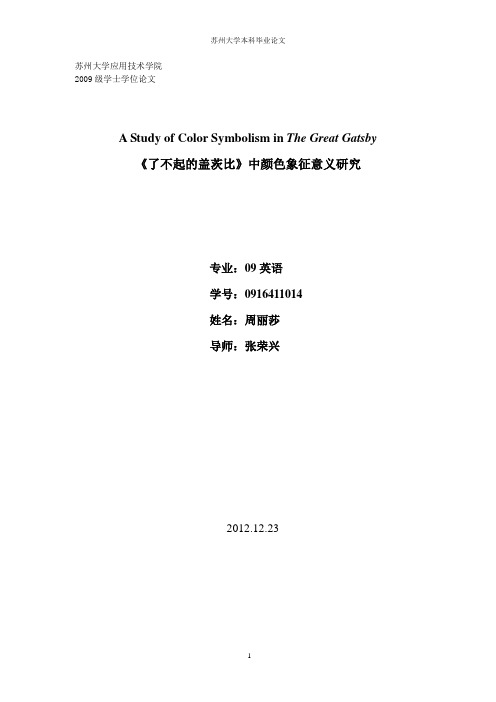
苏州大学应用技术学院2009级学士学位论文A Study of Color Symbolism in The Great Gatsby《了不起的盖茨比》中颜色象征意义研究专业:09英语学号:0916411014姓名:周丽莎导师:张荣兴2012.12.23AcknowledgementsThe thesis would probably have never been possible without the help, support, foresight and inspiration of my supervisor, teachers and classmates, so I would like to take this opportunity to express my heartfelt gratitude to all of them.My deepest gratitude goes first to my supervisor, Mr. Zhang Rongxing, who has contributed to getting the nuts and bolts of the thesis into place. His careful and microscopic scrutiny of the manuscript resulted in the elimination of many inconsistencies and in the development of the study throughout the thesis. His witty ideas and valuable advice brought me a new way of learning and different vision of the research.What’s m ore, my thanks go to my parents and friends who give me support and encouragement.AbstractFrancis Scott Fitzgerald, one of the most prominent novelists in American literary history in the 1920s, has been regarded as “the singer of the jazz age”, and “chronicler” and “poets Laureate”. He works give us an accurate picture of the social state of America in early twenties of last century. The Great Gatsby is Fitzgerald’s finest n ovel, which was published in 1925, and Eliot considered it “to be the first step that America has taken since Henry James”. Finished in 1925, this novel wins lots of favorable praise. Nowadays, people keep reading it, and many films have been adopted from it.Just as above said, The Great Gatsby is a symbolism story, in which, many color symbols are used, for example, green and green light, blue, yellow or golden and so on. This paper will analyze the novel by means of the respective symbolism meanings of these color symbols.Key words: Francis Scott Fitzgerald; The Great Gatsby; color; symbolism.摘要美国著名象征主义代表作家Francis Scott Fitzgerald ,20世纪20年代美国文坛最著名的作家之一,素有爵士时代代言人,编年史家和桂冠诗人的称号。
分析维多利亚女王的英文作文

First of all, the British have a longer history than the United States or other European countries. The feudal rule of a British makes people more tolerant, the quality of the content and the British are an isolated island on the European continent. Despite the geographical concept, we think that English is a part of Europe, but in fact, the isolated geographical position makes Britain and Europe think that "one independent" We also talked about one of the most famous Queen Victoria in British history.During the six years of Queen Victoria's rule, Queen Victoria gradually became the British heyday. At the same time, she was also British During the main period of the formation of national etiquette, Queen Victoria finally made Britain a world-famous "formal country". Because of her elegant personal cultivation and European reputation, Queen Victoria made a series of strict rules for her children, all of which were trained in the aspect of criticizing.She was very strict with herself, elegant and decent, dignified and warm The characteristics of wenerya (dignified and decent), no Victorian customer will be called "Social Science (exquisite queen of England) has had a great impact on the middle class (from the scale). From this period, they have the highest standard of imitating gentlemen and other gentleman's words. This is the final formation and improvement of Victorian British gentlemen, ofcourse, with the development of society and the country With the deepening of international communication, British personality changes subtly with the change of values, which unconsciously affects the gentlemanly generation.The British understand the potential of their culture. Language and culture are of great benefit to the mastery of Westerners.。
The Victorian Age英国文学维多利亚时期
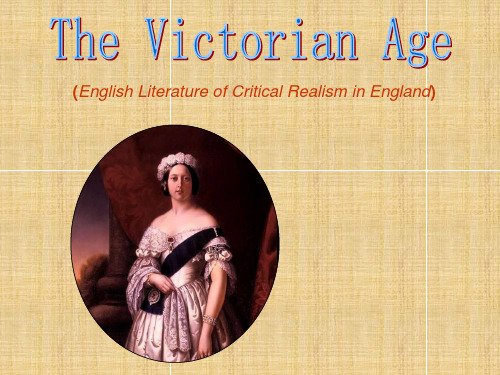
1837年维多利亚女王即位时,英国已经完成了资本主义工业革命, 为了满足国家寻找原料地和销售市场的要求,英国开始在世界各地建立 殖民地和自治领。1840年英国占领了新西兰,这标志着英国在全世界的 殖民体系形成。英国对中国的野心由来已久。英国与中国的贸易最早始 于茶叶、丝绸的贸易;但是这些商品是英国市场上的奢侈品,而中国自 给自足的经济体制使得英国的工业革命的产品毫无用武之地。为了扭转 对华贸易逆差,英国商人开始在英国政府的支持下倾销鸦片。1839年, 林则徐在虎门销烟,极大程度上打击了英国政府的倾销政策,1840年初, 维多利亚女王在议会上发表了著名的演说,呼吁“为了大英帝国的利 益”,向中国发动战争。第一次鸦片战争遂始。
• The Chartist Movement (1836-1848 )was organized by the English workers in big cities and brought forth the People’s Charter, in which they demanded basic rights and better living and working conditions. The movement brought some improvement to the welfare of the working class. It was the first mass movement of the English working class and the early sign of the awakening of the poor, oppressed people.
The Victorian age (1832-1901)
◆ Historical Situation Reign of Queen Victoria: 1837-1901
维多利亚时代的价值观【英文】

Victorian society was
distinctly Christian They placed a high value on personal modesty and on “gravity”
Victorian Attitudes and Values
Victorian values included a strict moral code and an
fever, influenza, tuberculosis
Little was known about
disease or hygiene Prior to the discovery of germs and antiseptics, doctors often infected patients during operations
and substantial
Indication of importance
Large houses were also
necessary because large families were common Victorians loved decorated furniture, heavy curtains, and knick-knacks The poor lived in small houses in the poorer sections of town
obsession with social status
Occupation and social standing was determined by family background and social connections
They were also materialistic The Victorian era was not grim, but very optimistic
认真的重要性

Victorian era(1832-1902 )
• The Victorian Age was a period of rapid growth, development, and reforms. England became a typical capitalist country and the struggle between the workers and capitalists became the fundamental contradiction in English social life. • The Victorian Age is one of the greatest and most creative periods in the history of English literature. • The most important literary movement in the lateVictorian period is the Aestheticism(唯美主义) , represented by Oscar Wilde.
Life Attitude---Serious or Trivial Wilde emphasizes on dressing, eating, drinking in this play, which is obviously a reaction against Victorian morality emphasizing on duty, work and thrift. In his opinion, we should treat all trivial things in life very seriously, and all serious things of life with a sincere and studied triviality. The theme is also hinted at in the play ’s ironic title, and it continues in the drawing room discussion. Algernon: Yes, but you must be serious about it. I hate people who are not serious about meals. It is so shallow of them.(P158)
英美文学名词解释最全版
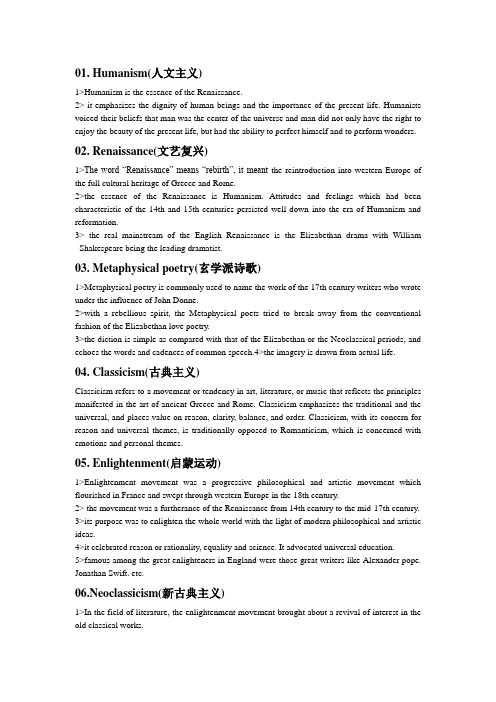
01. Humanism(人文主义)1>Humanism is the essence of the Renaissance.2> it emphasizes the dignity of human beings and the importance of the present life. Humanists voiced their beliefs that man was the center of the universe and man did not only have the right to enjoy the beauty of the present life, but had the ability to perfect himself and to perform wonders.02. Renaissance(文艺复兴)1>The word “Renaissance”means “rebirth”, it meant the reintroduction into western Europe of the full cultural heritage of Greece and Rome.2>the essence of the Renaissance is Humanism. Attitudes and feelings which had been characteristic of the 14th and 15th centuries persisted well down into the era of Humanism and reformation.3> the real mainstream of the English Renaissance is the Elizabethan drama with William Shakespeare being the leading dramatist.03. Metaphysical poetry(玄学派诗歌)1>Metaphysical poetry is commonly used to name the work of the 17th century writers who wrote under the influence of John Donne.2>with a rebellious spirit, the Metaphysical poets tried to break away from the conventional fashion of the Elizabethan love poetry.3>the diction is simple as compared with that of the Elizabethan or the Neoclassical periods, and echoes the words and cadences of common speech.4>the imagery is drawn from actual life.04. Classicism(古典主义)Classicism refers to a movement or tendency in art, literature, or music that reflects the principles manifested in the art of ancient Greece and Rome. Classicism emphasizes the traditional and the universal, and places value on reason, clarity, balance, and order. Classicism, with its concern for reason and universal themes, is traditionally opposed to Romanticism, which is concerned with emotions and personal themes.05. Enlightenment(启蒙运动)1>Enlightenment movement was a progressive philosophical and artistic movement which flourished in France and swept through western Europe in the 18th century.2> the movement was a furtherance of the Renaissance from 14th century to the mid-17th century.3>its purpose was to enlighten the whole world with the light of modern philosophical and artistic ideas.4>it celebrated reason or rationality, equality and science. It advocated universal education.5>famous among the great enlighteners in England were those great writers like Alexander pope. Jonathan Swift. etc.06.Neoclassicism(新古典主义)1>In the field of literature, the enlightenment movement brought about a revival of interest in the old classical works.2>this tendency is known as neoclassicism. The Neoclassicists held that forms of literature were to be modeled after the classical works of the ancient Greek and Roman writers such as Homer and Virgil and those of the contemporary French ones.3> they believed that the artistic ideals should be order, logic, restrained emotion and accuracy, and that literature should be judged in terms of its service to humanity.07. The Graveyard School(墓地派诗歌)1>The Graveyard School refers to a school of poets of the 18th century whose poems are mostly devoted to a sentimental lamentation or meditation on life. Past and present ,with death and graveyard as themes.2>Thomas Gray is considered to be the leading figure of this school and his Elegy written in a country churchyard is its most representative work.08. Romanticism(浪漫主义)1>In the mid-18th century, a new literary movement called romanticism came to Europe and then to England.2>It was characterized by a strong protest against the bondage of neoclassicism, which emphasized reason, order and elegant wit. Instead, romanticism gave primary concern to passion, emotion, and natural beauty.3>In the history of literature. Romanticism is generally regarded as the thought that designates a literary and philosophical theory which tends to see the individual as the very center of all life and experience. 4> The English romantic period is an age of poetry which prevailed in England from 1798 to 1837. The major romantic poets include Wordsworth, Byron and Shelley.09. Byronic Hero(拜伦式英雄)1>Byronic hero refers to a proud, mysterious rebel figure of noble origin.2> with immense superiority in his passions and powers, this Byronic Hero would carry on his shoulders the burden of righting all the wrongs in a corrupt society. And would rise single-handedly against any kind of tyrannical rules either in government, in religion, or in moral principles with unconquerable wills and inexhaustible energies.3> Byron’s chief contribution to English literature is his creation of the “Byronic Hero”10. Critical Realism(批判现实主义)1>Critical Realism is a term applied to the realistic fiction in the late 19th and early 20th centuries.2> It means the tendency of writers and intellectuals in the period between 1875 and 1920 to apply the methods of realistic fiction to the criticism of society and the examination of social issues.3> Realist writers were all concerned about the fate of the common people and described what was faithful to reality.4> Charles Dickens is the most important critical realist.11. Aestheticism(美学主义)1>The basic theory of the Aesthetic movement--- “art for art’s sake” was set forth by a French poet, Theophile Gautier, the first Englishman who wrote about the theory of aestheticism was Walter Pater.2> aestheticism places art above life, and holds that life should imitate art, not art imitate life.3> According to the aesthetes, all artistic creation is absolutely subjective as opposed to objective. Art should be free from any influence of egoism. Only when art is for art’s sake, can it be immortal. They believed that art should be unconcerned with controversial issues, such as politics and morality, and that it should be restricted to contributing beauty in a highly polished style.4> This is one of the reactions against the materialism and commercialism of the Victorian industrial era, as well as a reaction against the Victorian convention of art for morality’s sake, or art for money’s sake.美学运动的基本原则”为艺术而艺术”最初由法国诗人西奥费尔.高缔尔提出,英国运用该美学理论的第一人是沃尔特.佩特.美学主义崇尚艺术高于生活,认为生活应模仿艺术,而不是艺术模仿生活.在美学主义看来,所有的艺术创作都是绝对主观而非客观的产物.艺术不应受任何功利的影响,只有当艺术为艺术而创作时,艺术才能成为不朽之作.他们还认为艺术不应只关注一些热点话题如政治和道德问题,艺术应着力于以华丽的风格张扬美.这是对维多利亚工业发展时期物质崇拜的一种回应,也是向艺术为道德或为金钱而服务的维多利亚传统的挑战.12.The Victorian period(维多利亚时期)1>In this period, the novel became the most widely read and the most vital and challenging expression of progressive thought. While sticking to the principle of faithful representation of the 18th century realist novel, novelists in this period carried their duty forward to criticism of the society and the defense of the mass.2> although writing from different points of view and with different techniques, they shared one thing in common, that is, they were all concerned about the fate of the common people. They were angry with the inhuman social institutions, the decaying social morality as represented by the money-worship and Utilitarianism, and the widespread misery, poverty and injustice.3>their truthful picture of people’s life and bitter and strong criticism of the society had done much in awakening the public consciousness to the social problems and in the actual improvement of the society.4> Charles Dickens is the leading figure of the Victorian period.13. Modernism(现代主义)1>Modernism is comprehensive but vague term for a movement , which begin in the late 19th century and which has had a wide influence internationally during much of the 20th century.2> modernism takes the irrational philosophy and the theory of psycho-analysis as its theoretical case.3> the term pertains to all the creative arts. Especially poetry, fiction, drama, painting, music and architecture.4> in England from early in the 20th century and during the 1920s and 1930s, in America from shortly before the first world war and on during the inter-war period, modernist tendencies were at their most active and fruitful.5>as far as literature is concerned, Modernism reveals a breaking away from established rules, traditions and conventions. fresh ways of looki ng at man’s position and function in the universe and many experiments in form and style. It is particularly concerned with language and how to use it and with writing itself.14. Stream of consciousness(意识流)(or interior monologue)In literary criticism, Stream of consciousness denotes a literary technique which seeks to describe an individual’s point of view by giving the written equivalent of the character’s thought processes. Stream of consciousness writing is strongly associated with the modernist movement. Its introduction in the literary context, transferred from psychology, is attributed to May Sinclair. Stream of consciousness writing is usually regarded as a special form of interior monologue and is characterized by associative leaps in syntax and punctuation that can make the prose difficult to follow, tracing as they do a character’s fragmentary thoughts and sensory feelings. Famous writers to employ this technique in the English language include James Joyce and William Faulkner.学术界认为意识流是一种通过直接描述人物思维过程来寻求个人视角的文学写作技巧。
维多利亚时期

However,with the development of industry,the ideology意识形态 of society changed. The "Crisis of Faith" happened, which would hit religion and the citizens' faith like a brick. The Crisis of Faith was brought about in 1859 with Charles Darwin's work On the Origin of Species; His theory differed from people's original faith.Young people don't know what to believe.They tend to escape in different ways.
• It can be divided into 3 periods:
Early Victoria Period (1837-1848) Middle Victoria Period (1848-1870) Late Victoria Period (1870-1901)
Politically
• The early period is a period of great social unrest动荡的局面 (Chartist Movement 1838-48); • Reform Bill (1832) was enacted, giving right to representation of growing cities and 50% raise of electorate to middle class.
维多利亚道德观 英文

维多利亚道德观英文The Victorian Moral CompassThe Victorian era, spanning from the accession of Queen Victoria in 1837 to her death in 1901, was a period of profound social, economic, and cultural transformation in Great Britain. During this time, the nation experienced rapid industrialization, the expansion of the British Empire, and the emergence of a new middle class. Alongside these sweeping changes, the Victorian era was also marked by a strong emphasis on morality, propriety, and social decorum.At the heart of the Victorian moral compass was a deep-rooted belief in the importance of upholding traditional values and maintaining a strict social hierarchy. The Victorian elite, who were largely composed of the aristocracy and the growing middle class, placed a premium on virtues such as hard work, self-discipline, and adherence to social norms. This ethos was reinforced through various institutions, including the church, the education system, and the media.One of the defining features of Victorian morality was the emphasison sexual purity and the sanctity of the family. The Victorian ideal of womanhood centered around the notion of the "angel in the house,"a virtuous, self-sacrificing figure who was responsible for maintaining the moral and spiritual well-being of the household. Women were expected to be chaste, demure, and devoted to their husbands and children, while men were expected to be the moral and financial providers for their families.This rigid gender ideology had far-reaching consequences for the lives of Victorian women. Many were confined to the domestic sphere, with limited opportunities for education, employment, and political participation. Those who dared to challenge the prevailing social norms, such as the early pioneers of the women's suffrage movement, were often met with fierce opposition and social ostracization.The Victorian preoccupation with morality also extended to other areas of social life, including the arts and literature. The Victorian era witnessed the rise of a thriving publishing industry, which catered to the growing middle-class readership. However, this industry was also subject to strict censorship, with many works of art and literature being deemed unsuitable for public consumption due to their perceived moral transgressions.The Victorian obsession with morality was not limited to the upperechelons of society; it also permeated the lives of the working class. The Victorian philanthropic movement, driven by a desire to alleviate the suffering of the urban poor, often sought to impose middle-class values and behavioral norms on the lower classes. This included efforts to promote temperance, encourage thrift and self-improvement, and instill a sense of moral duty and social responsibility.Despite the pervasive influence of Victorian morality, it is important to recognize that the era was not monolithic, and there were significant pockets of resistance and dissent. The growth of the working-class movement, the emergence of alternative religious and philosophical traditions, and the increasing visibility of marginalized groups challenged the dominant moral order and paved the way for more progressive social and cultural changes.Moreover, the Victorian moral compass was not without its contradictions and hypocrisies. While the elite championed the virtues of sexual purity and family values, many also engaged in extramarital affairs, exploited the labor of the working class, and perpetuated the oppression of colonial subjects. This disconnect between the ideals and the realities of Victorian society has been the subject of much scholarly and popular scrutiny.In conclusion, the Victorian moral compass was a complex andmultifaceted phenomenon that shaped the social, cultural, and political landscape of Britain during the nineteenth century. While it reflected the values and aspirations of the dominant classes, it also gave rise to resistance, dissent, and the gradual erosion of traditional social hierarchies. The legacy of Victorian morality continues to be debated and reinterpreted by scholars and the public alike, offering insights into the enduring tensions and transformations that have defined the modern world.。
维多利亚盛世【英文】

The double standard
• Idealization of women: angelic figures (mother and young girl) not only physically but also morally • This difference justified different codes of behaviour and education for men and for women
Slums & back to back houses
It was a town of red brick…
Victorian Laws
• • • • • • • • 1842 – 46 Mines Act 1847 Ten Hour Bill 1848 Public Health Act 1867 2nd Reform Act (almost all men could vote) 1870 Education Act 1871 Trade Unions became legal 1884 3rd Reform Act(suffrage for all men) 1901 Labour Party
Women
• Essentialism: the idea that differences between men & women were determined by nature and women were ‘naturally ‘unsuited for male roles (as men were ‘naturally‘superior)
The Angel in the House
Women's clothing symbolised their constricted lives. Tight lacing into corsets and cumbersome multiple layers of skirts which dragged on the ground impeded women's freedom of movement. Between 1856 and 1878, among the wealthy, the cage crinoline was popular as it replaced the many layers of petticoats, but it was cumbersome and humiliating. Sitting down, the cage rode up embarrassingly at the front. The skirts were so wide that many women died engulfed in flames after the material caught fire from an open grate or candle.
victorian morality
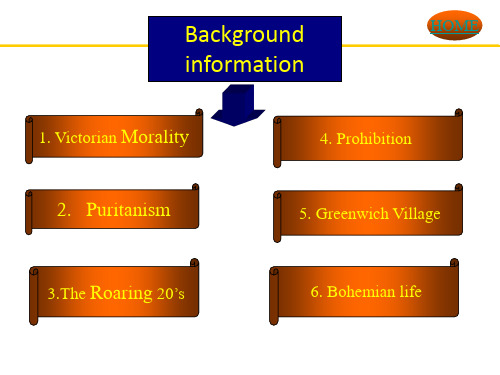
Queen Victoria ruling time 1837 -1901
• Victoria, queen of Great Britain and Ireland (1837–1901) and empress of India (1876–1901). • She was the daughter of duke of Kent (fourth son of George III) and Princess Mary Louise Victoria. Victoria's father died before she was a year old. • in 1837, at the age of 18, she succeeded her uncle, William IV, to the throne. • In 1840, Victoria married her first cousin, Prince Albert of Saxe-Coburg-Gotha In 1861, Albert (who had been named prince consort in 1857) died.
3. people pursued a kind of national spirit, including enthusiasm ,self-respect, modesty and patriotism. Also hard work,
self-reliance, cleanliness, The term Victorian has acquired a range of connotations, including that of particularly strict set of moral standards, which are often applied hypocritically.
- 1、下载文档前请自行甄别文档内容的完整性,平台不提供额外的编辑、内容补充、找答案等附加服务。
- 2、"仅部分预览"的文档,不可在线预览部分如存在完整性等问题,可反馈申请退款(可完整预览的文档不适用该条件!)。
- 3、如文档侵犯您的权益,请联系客服反馈,我们会尽快为您处理(人工客服工作时间:9:00-18:30)。
Victorian morality is a distillation of the moral views of people living at the time of Queen Victoria (reigned 1837 - 1901) in particular, and to the moral climate of Great Britain throughout the 19th century in general that were in stark contrast to the morality of the previous Georgian period. It is not tied to this historical period and can describe any set of values that espouses sexual repression, low tolerance of crime, and a strong social ethic. Due to the prominence of the British Empire, many of these values were spread across the world.
Historians now regard the Victorian era as a time of many contradictions.
A plethora(过多) of social movements concerned with improving public morals co-existed with a class system that permitted harsh living conditions for many. The apparent contradiction between the widespread cultivation of an outward appearance of dignity and restraint and the prevalence of social phenomena that included prostitution and child labour were two sides of the same coin: various social reform movements and high principles arose from attempts to improve the harsh conditions.
The term Victorian has acquired a range of connotations, including that of a particularly strict set of moral standards, which are often applied hypocritically. This stems from the image of Queen Victoria—and her husband, Prince Albert, perhaps even more so—as innocents, unaware of。
